Cooperation Potential
SPECIAL EDITION - SWITZERLAND 2023
EDITOR IN CHIEF
Neda Lukić n.lukic@aim.rs

DESIGN Slađan Radosavljević Zoran Perović design@aim.rs
PHOTOS Zoran Petrović COPY EDITOR Mark Pullen
06 H.E. URS SCHMID Swiss Ambassador






PROJECT MANAGERS Biljana Dević b.devic@aim.rs Mihailo Čučković m.cuckovic@aim.rs
OFFICE MANAGER Svetlana Petrović s.petrovic@aim.rs
FINANCE Dragana Skrobonja finance@aim.rs



EXECUTIVE DIRECTOR Maja Vidaković m.vidakovic@aim.rs
DIRECTOR Ana Novčić a.novcic@cordmagazine.com
17 MILENA GAJOVIĆ SHRESTHA General Manager, SR Technics Services Engine Business Leader Maintains Leadership
PRINTING Rotografika d.o.o. Segedinski put
72, Subotica
02 SWITZERLAND 2023 Contents
Published by: alliance international media Prote Mateje 52, 11111 Belgrade 17, PAK 125806, Serbia Phone: +(381 11) 2450 508 E-mail: office@aim.rs; office@cordmagazine.com www.aim.rs; www.cordmagazine.com ISSN: 2560-4465 All rights reserved alliance international media 2023 The views expressed in this publication are those of the presenter; they do not necessary reflect the view of publications published by alliance international media THIS PUBLICATION IS FREE OF CHARGE
to
Productive Workforce 10
of
Successes That Should Be Repeated 14
for
PUBLISHER Ivan Novčić i.novcic@aim.rs and Montenegro at Novartis Prevention Protects Health and
SWITZERLAND 2023
Serbia Serbia Needs a More
MAJO MIĆOVIĆ President of the Swiss-Serbian Chamber
Commerce, SSCC
NIKOLA STOJKOVIĆ Managing Director
Serbia
Budgets 15 Standing Conference of Towns and Municipalities (SCTM) Two Decades of Swiss Support
16 IP CONSULT GMBH Towards a Better Prepared and More Competitive Serbia
18 HELVETAS Valuable Swiss Support to Serbia
Snežana
Mišić
Mihajlović,
international team leader of the ACT project Gorana Radovanović, adviser on the ACT project Aleksander Grunauer, international Team leader MED, Accountable local finances and citizen participation
24
28
30


Executive
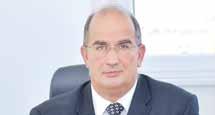

of the




cordmagazine.com 03 32
ACTIVITIES Eventful Year 36 ECONOMICS Strong Partner With
Experience 40 TRAVEL - CULTURAL DESTINATIONS Must-Visit Cultural Destinations in Switzerland
SSCC
Precious
27 DRAGAN GAVRILOVIĆ General Manager, SIKA Sika Serbia Absolute Leader 22 SIMO VULETA Managing Director at Prodyna, SSCC Board Member Focused on Growth and Innovation
23 STEVICA ČARAPIĆ
MSC Regional Managing Director (Serbia/Montenegro/North Macedonia)
Connecting the Region with Global Ports
DR MATTHIAS FUNK
Managing Director at gategroup Services d.o.o. Belgrade Innovation is the Driving Force
OLEG STEFANOVIĆ Managing Director, Produkt Bg Inženjering Transferring Knowledge and Technology is Key to Success
ANA GRUJOVIĆ
Director
Swiss-Serbian Chamber of Commerce, SSCC Rapid Economic Growth is Based on Innovation
Switzerland 2023
29 MARJANA DAVIDOVIĆ General Manager at Nestlé Adriatic Support for Regenerative Agriculture

Unlocking Full Potential For Cooperation

The flourishing trade between Serbia and Switzerland demonstrates the strength and mutual benefits of the two countries’ bilateral ties, presenting promising opportunities for deeper cooperation and sustained economic growth
Serbia recently became Switzerland’s 4th largest partner, boasting a total trade volume of 1.2 billion euros and a surplus of 151.6 million euros on the Serbian side. These figures are truly remarkable and illustrate the strong bilateral relationship between the two countries, while also highlighting the potential for further progress.
This success can be primarily attributed to Serbia’s rapid growth in the ICT sector, which represents its fastest-growing industry. By seamlessly integrating into global ICT value chains and capitalising on the software outsourcing boom, Serbia has established a robust international presence. Serbian IT companies have gained a reputation for delivering top-quality services, thanks to their high-
Harnessing Swiss expertise in the realm of dual vocational education offers a promising route to foster economic growth and prosperity
ly skilled IT specialists and cost-effectiveness.
However, in order to ensure continued economic growth and prosperity, and to strengthen collaboration with Swiss business partners, it is essential for Serbia to address crucial challenges and unlock its full potential.
Firstly, there is a need to tackle the shortage of skilled labour. While Serbia boasts a robust education system, it is necessary to align it more closely with the needs of the labour market. Surveyed Swiss companies operating in Serbia have stressed the importance of creat-
ing a workforce that drives productivity growth and fosters economic development.
Secondly, a persistent youth unemployment rate of 26.5% remains a concern. Targeted policies are required to provide young people with a proper education and enable their swift entry into the labour market, thus contributing to economic growth.
Furthermore, increasing labour force participation is a challenging task in an economy that’s experiencing comparatively low activity compared to the OECD average. Encouraging more people to actively participate in the labour market, which can serve to boost productivity and fuel economic growth, requires measures like improving labour market flexibility and enhancing job matching mechanisms.
Additionally, Serbia’s stagnating productivity – at both the level of labour and within SMEs – influences wage growth and the appeal of the domestic labour market to young Serbs. Encouraging innovation, investing in research and development and supporting SMEs can revitalise productivity and stimulate economic growth.
In an effort to address these challenges, Swiss development support encompasses assistance to Serbia’s governance, economic and environmental sectors. Moreover, collaboration on dual vocational education has proven vital in terms of aligning workforce training with the needs of the market, leading to enhanced labour and company productivity, higher salaries and addressing the key driver of emigration: a lack of economic opportunity. Leveraging Swiss expertise in this collaboration presents a promising pathway to overcome these challenges and pave the way to further economic growth and prosperity.
COMMENT
Serbia Needs a More Productive Workforce
The Swiss-Serbian Chamber of Commerce’s recent Business Climate Survey highlighted labour force quality and skill shortages as being among the top challenges for businesses operating in Serbia. An insufficient number of graduates and a dearth of experience have been identified as significant impediments ~ Urs Schmid
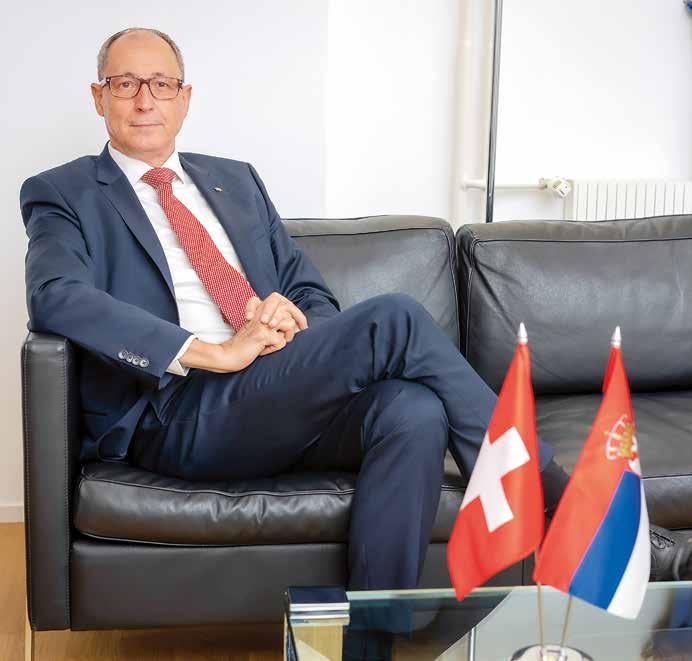
06 SWITZERLAND 2023 INTERVIEW | H.E. URS SCHMID SWISS AMBASSADOR TO SERBIA
The economic partnership between Switzerland and Serbia is intensifying in various areas. Switzerland has become Serbia’s 4th largest partner in trade in services. Thanks to the ICT sector, Serbia records a surplus of 151.6 million euros in the trade in services. Rail sector giant Stadler is boosting its cooperation with Kragujevac, while company Etampa has launched the production of parts for the auto industry at its factory in Kruševac. “We remain committed to positively influencing Serbia’s governance, economic and environmental sectors,” says Ambassador Urs Schmid in this interview for CorD Magazine.
Your Excellency, given that half of your tenure in Serbia has already elapsed, what could you say about the current state of bilateral relations between Switzerland and Serbia?
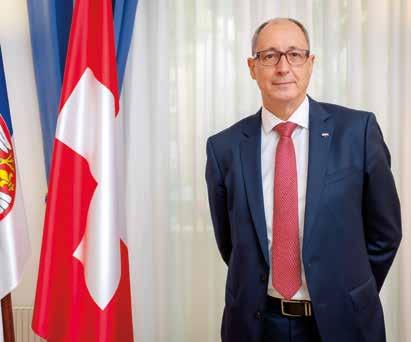
I am pleased to note that relations between our two nations are experiencing a steady and encouraging progression.
Our economic ties have grown substantially over the past few years. Since 2018, our bilateral trade has almost doubled and stood at 804 million CHF in 2022. This notable increase is indicative of the robustness and resilience of our economic partnership, even in the face of global challenges.
This shared commitment was demonstrated during the successful Joint Economic Commission that took place in June in Bern. The official talks were followed by a visit to a wastewater treatment plant, where the Serbian delegation, comprising representatives of different Ministries, was able to glean some useful information to take back for Serbia’s wastewater treatment projects.
Earlier this year, Swiss State Secretary of Foreign Affairs Livia Leu hosted her counterpart, State Secretary Goran Aleksić, for a round of regular political consultations. Security in the Western Balkans and the Belgrade-Pristina dialogue were important aspects of the discussion, as were our joint efforts in the areas of police cooperation and migration, as well as Serbia’s regional and EU integration processes.
Serving in this dynamic context is a pleasure, and I eagerly anticipate the continued enhancement of our bilateral relations during the remainder of my tenure.
How is implementation progressing when it comes to the Swiss programme of cooperation with Serbia for the 2022-2025 period, during which you’ve envisaged, among other things, support for local government and civil society in employment projects, economic development and adapting to climate change?
COOPERATION
Shared commitment was demonstrated during the successful Joint Economic Commission that took place in June in Bern
COMMITMENT
We remain committed to positively influencing Serbia’s governance, economic and environmental sectors
REGULATIONS
By adapting its current skill development policies and regulations, Serbia can cultivate a more productive workforce to meet the demands of businesses
Approaching the midpoint of our current cooperation programme with Serbia, the Swiss Embassy team has made substantial strides, working side-by-side with our Serbian counterparts and aligning our efforts with Serbia’s strategic priorities. This includes bolstering local governance and renewing partnerships with government institutions, civil society organisations and the private sector. We have significantly boosted our engagement in economic growth, with notable initiatives like the “SME Hub” programme enhancing local enterprise development and job creation. In climate change efforts, we continue our longstanding support for energy transition, with a focus on efficiency and renewable sources, and we have become a key contributor to Serbia’s “Green Agenda” programme. We remain committed to positively influencing Serbia’s governance, economic and environmental sectors.
It was announced recently that Swiss company Stadler will engage in railway production in Kragujevac, which is a significant development in the process of revitalising Serbian railways. Could you speak about this collaboration?
We have indeed seen the development of successful collaboration between Swiss company Stadler Rail and Serbian Railways. The execution of the high-speed train project in just six months from its inception in April 2021 to the “roll-in” of the first train in October is testament to the diligent efforts of Serbian partners and the impeccable performance of Stadler Rail. The company is currently exploring potential partnerships with
cordmagazine.com 07
Mind Group in Kragujevac, focusing on railway component production and train manufacturing.
Serbia has recognised the strategic importance of rail transport and has been investing heavily in the revitalisation of its railway infrastructure. In this endeavour, Swiss companies are emerging as trusted partners.
Swiss company Etampa recently opened a factory in Kruševac to produce parts for the automotive industry, though it was announced at the same time that the factory is struggling to find adequate workers. To what extent is the Swiss business community in Serbia facing problems related to the lack of qualified workers?
The Swiss-Serbian Chamber of Commerce’s recent Business Climate Survey highlighted that labour force quality and skill shortages are among the top challenges for businesses operating in Serbia. An insufficient number of graduates and a dearth of experience have been identified as significant impediments.
Serbia’s economy has seen marked improvements, transforming the labour market and employment indicators. A thriving economy depends on a skilled workforce that’s capable of adapting to a technologically evolving market and driving productivity growth. Although Serbia boasts a robust education system, there is room for improvement in terms of matching education to the needs of the labour market. By adapting its current skill development policies and regulations, Serbia can cultivate a more productive workforce to meet the demands of businesses and foster economic growth.
The Dual Education concept, which has received strong Swiss support, was supposed to be one of the best ways to overcome this problem. Is this concept proving better at solving the problem of skilled labour in Serbia or enabling the even quicker departure of workers from the country?
Despite improvements in job creation and a decline in unemployment, Serbia’s youth unemployment remains high, at 26.5%, and labour force participation is low compared to the OECD average. Productivity is stagnating, both at the labour level and within SMEs, restricting wage growth and, consequently, the domestic labour market’s appeal to the Serbian youth.
This situation emphasises the potential value of dual vocational education. By training a labour force to meet market needs, both labour productivity and company productivity can be boosted, leading to higher salaries and mitigating one of the main drivers of emigration. Therefore, Switzerland, in collaboration with the Serbian Govern-
ment and the Chamber of Commerce and Industry, is investing heavily in dual vocational education, utilising specific Swiss expertise. However, the effects of these efforts will only be seen in the mid- to long-term, because a shift in approach needs to take place and this necessarily takes time.

You announced late last year that Serbia has been recognised as a net exporter of IT services to Switzerland, with the value of that exchange having even exceeded the value of the goods trade between the two countries. What makes these Serbian companies recognisable in Switzerland?
When it comes to trade in services, it is impressive to note that Switzerland has become Serbia’s 4th largest partner, with a total trade volume of 1.2 billion euros and a surplus of 151.6 million euros in Serbia’s favour. This is largely due to the Serbian ICT sector, as the country’s fastest-growing industry. Serbia has successfully integrated into global ICT value chains and has benefited from the continuous boom in software outsourcing. Serbian IT companies are recognised in Switzer-
08 SWITZERLAND 2023
Serving in this dynamic context is a pleasure, and I eagerly anticipate the continued enhancement of our bilateral relations during the remainder of my tenure
Serbian IT companies are recognised in Switzerland and elsewhere for the quality services provided by highly skilled IT specialists and relatively low production costs
land and elsewhere for the quality services provided by highly skilled IT specialists and relatively low production costs. Language skills are another remarkable advantage. It certainly pays off that foreign language learning is compulsory from the first year of primary school in Serbia.
A recent referendum in Switzerland led to the adopting of a law on climate change. When it comes to climate change, how much can such moves at the single country level contribute to shifting consciousness and policies at the global level?
On 18th June, 59.1% of Swiss voters accepted the Climate and Innovation Act, making it the first country to vote for net-zero greenhouse gas emissions by 2050. This law is not just about protecting the environment, as it also holds long-term economic benefits. The shift to renewables also spurs innovation and job creation.

As an Alpine country, Switzerland is particularly hard hit by climate change. Earlier climate protection efforts have already resulted in an 18% reduction in greenhouse gas emissions from 1990 levels by 2021.
Tackling climate change certainly requires global collaboration, as highlighted by the Paris Agreement, which Switzerland supports. But I am also convinced that early moves at the single country level will pay off in economic terms and provide good reasons to follow suit.
Since 2018, our bilateral trade has almost doubled and stood at 804 million CHF in 2022
Switzerland has become Serbia’s 4th largest partner, with a total trade volume of 1.2 billion euros
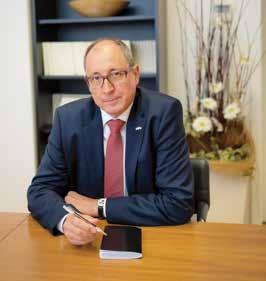
On 18th June, 59.1% of Swiss voters accepted the Climate and Innovation Act

Successes That Should Be Repeated
SSCC member companies are extremely satisfied that digitalisation and e-government have gained great importance within the scope of the Government of the Republic of Serbia’s structural reform measures, and they expect similar advances when it comes to the Green Agenda
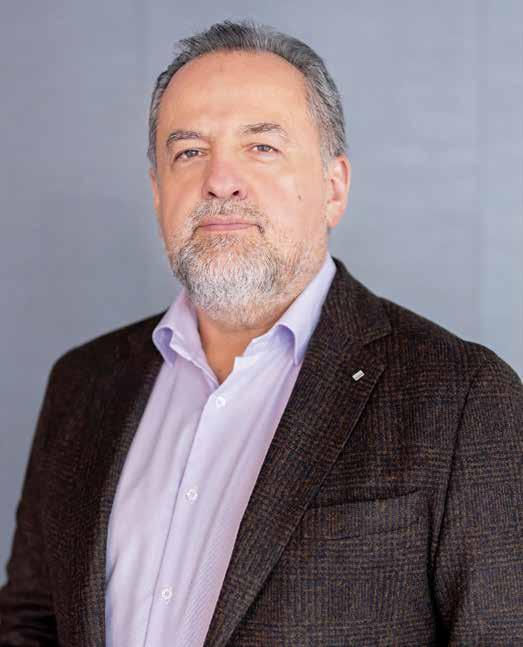
The majority of countries –Serbia included – are currently confronted by inflation problems that lead to a slowdown in economic growth. However, members of the Swiss-Serbian Chamber of Commerce are on the whole optimistic regarding their operations in Serbia. Also testifying to this is the research survey entitled “Questionnaire on the business climate in Serbia in 2023”, which was conducted by the Swiss-Serbian Chamber of Commerce among its member companies in April 2023. The majority of respondent companies (71.43%) rated the Serbian business climate as satisfactory. When it comes to comparing business conditions year-on-year, 53.57% of surveyed members companies believe that conditions will remain unchanged compared to 2022, explains SSCC President Majo Micović.
This survey’s results also show that most companies expect further changes to the business climate in the areas of the efficiency of public institutions and administrations, the enforcement of legislation and on the ensuring of legal certainty and stability.
In the opinion of the expert public, but also the IMF, Serbia should devote more attention to structural reforms. From the perspective of the SSCC, in which areas has good progress been made on regulatory reforms and where do you see room for further advances?
Within the framework of structural reform measures, the Government of the Republic of Serbia recognised the impor-
10 SWITZERLAND 2023 INTERVIEW | MAJO MIĆOVIĆ PRESIDENT OF THE SWISS-SERBIAN CHAMBER OF COMMERCE, SSCC
DIALOGUE

it is essential to secure the joint and coordinated work of all participants in the green transformation of the economy, and here maintaining a regular dialogue between the state and business is particularly important
tance of digitalisation and the development of e-government, which has contributed significantly to development in this area over the past few years. The results of the aforementioned SSCC survey show that our member companies are satisfied with the development of e-banking (85.71% of surveyed companies), e-government (78.57% of surveyed companies) and e-procurement (71.43% of surveyed companies). Priority positions in the area of digitalisation are occupied by artificial intelligence, cyber-security and biotechnology.
However, alongside the digital transformation of the economy, it is also essential to carry out the green transformation of the economy, and I expect the Green Agenda of the Republic of Serbia to enable local companies to develop sustainable business models, but also to apply innovative solutions with the aim of boosting their competitiveness, both on the domestic and world markets. Green transition not only requires the use of new technologies, but also additional employee training and advancing the capacity of companies to carry our research & development. These are the reasons why it is essential to secure the joint and coordinated work of all participants in the implementation of the green transformation of the economy, among which I would stress the importance of maintaining regular dialogue between the state and the business sector.
Your Chamber has its own digital taskforce, in the form of the SSCC Working Group on Digitalisation. Which topics are in the focus of this group and how do you see the development of the digitalisation process in Serbia?
The first meeting of the SSCC Working Group on Digitalisation was held in June, on the premises of company Roche d.o.o. The following topics were in the focus of
SECURITY
Cyber-security shouldn’t be viewed as an option, but rather as an indispensable part of the digital transformation plan of every company and organisation
INVESTMENT
It is necessary to continue investment in scientific and research work, and on the implementation of new technologies, particularly in the fields of agriculture and healthcare
well as the need to invest further in the digital transformation of enterprises.
Further meetings of the Working Group on Digitalisation are planned for this September and October, which will enable us to gather more information on the experiences and challenges confronting our member companies in the area of digitalisation.
Swiss companies are among the leading investors in Serbia in the area of IT, while successful Swiss companies attach great importance to improving the security of information systems and technologies. Based on your contacts with companies, what level would you say awareness of this is at in our country?
Cyber-attacks are ever more complex and frequent, and awareness of the necessity to protect sensitive data among companies is growing year-on-year.
Practice has shown that the largest number of cyber-attacks are enabled due to human error and carelessness. It is thus essential to raise awareness among employees in various positions in order to prevent human error that could endanger the entire information system, even if the latest, cutting-edge technologies are used for protection.
discussions: cyber-security as an important segment of the operations of every company and organisation; the use of artificial intelligence in daily operations (Chat GTP) and the need to further improve the legislative framework as it pertains to artificial intelligence; the need for further investment in scientific and research work and on the introduction of new technologies, particularly in the fields of agriculture and healthcare; as
Company Sky Express, whose operations I’m responsible for, is this year in a position to offer a unique platform for educating employees in various positions on safe behaviour in the digital environment.
This platform differs from others that are available on the market in that it was created as a result of collaboration with cyber-security experts, professional educators and psychologists specialised in the field of behavioural analytics. It is easy to use, available in the Serbian language and adapted to each user individually, all with the aim of encouraging
cordmagazine.com 11
SSCC member companies would like to see progress in the areas of the efficiency of public institutions and administrations, the enforcement of legislation and on the ensuring of legal certainty and stability
the safe behaviour of users in the digital world. It is implemented over the long term, in continuity, and becomes part of the daily routine during work.
We can only minimise the risk of cyber-attacks if a company’s entire team is educated in an adequate way.
Considering that cyber-security represents an extremely specific branch of the IT industry, I would direct companies and organisations towards technology experts who are able to help them protect one of the most valuable resources in their company: digital data. Cyber-security shouldn’t be viewed as an option, but rather as an indispensable part of the digital transformation plan of every company and organisation.
Cyber-security is an essential topic. In your opinion, what will be the biggest challenges in this area in 2024?
The biggest challenge in the area of cyber-security for years has been the shortage of trained and experienced personnel. And judging on the basis of

analyses and indicators, this trend will also continue in 2024, with a tendency for demand to increase.
The response to this challenge has also gradually crystallised and is represented by the offer of specialised cyber-security services (MSSP - Managed Security Services Provider), based on suitable tools and the best experts and engineers. Users are thereby able to significantly reduce the risk of threats, or even eliminate them completely. by engaging specialised cyber-security services.
Simply by comparing the financial and material resources required to establish an internal security programme, with the additional problem of a lack of human resources and with the cost of specialised cyber-security services, we reach an extremely favourable cost-benefit ratio that these services yield, and that do so from the very start of use of the service. Companies thereby ensure their operational continuity, as well as ensuring that their operations are aligned with regulations.
Bolstering Local Governance in Serbia
This programme, which is being jointly implemented by UN agencies in Serbia – UNOPS, UNICEF, UNFPA and UNEP – in cooperation with the Government of Serbia, is supported financially by the Government of Switzerland.

The Programme has been designed to enable continuous contributions from new partners, including from the private sector, while it also aims to inspire the business community to participate in Programme activities and thus contrib-
ute – through the enhancement of good governance, social inclusion and environmental protection – to the sustainable development of local communities across Serbia. This includes supporting local initiatives that contribute to a healthier and cleaner environment, the modernisation and digitalisation of public services, as well as interventions that will benefit informal waste collectors whose income is impacted by the construction of regional recycling centres.
12 SWITZERLAND 2023 12
The Joint UN Programme
“PRO - Local Governance for People and Nature” has begun implementing activities that will contribute to improving citizens’ quality of life in 99 eligible towns and municipalities in the regions of Šumadija and Western, Eastern and Southern Serbia
85.71% of surveyed SSCC members are satisfied with the development of e-banking, 78.57% with e-government and 71.43% with e-procurement

Prevention Protects Health and Budgets
Innovative pharmaceutical company Novartis, which is headquartered in Switzerland and has a global presence encompassing more than 140 countries, has appointed Nikola Stojković as the new managing director of its representative office for Serbia and Montenegro

Our aim is to improve access to innovative therapies for patients, through support in strengthening the local health ecosystem, public-private partnerships and bringing solutions in cooperation with all interested parties in the healthcare sector ~ announces Mr Stojković.
In which areas in Serbia do you see your company’s greatest contribution? Alongside a broad portfolio of medicines in numerous therapy areas, we see our most significant contribution in the treatment of cardiovascular diseases, oncology, hematology and autoimmune diseases. When we observe cardiovascu -
to heart attacks and ischemic strokes - showed total estimated annual costs to the state, for approximately 1.1 million people, exceeding 18 billion dinars, which accounts for five per cent of the total budget of the RFZO [The National Health Insurance Fund of the Republic of Serbia]. This study also showed that focused public health policy could save almost five billion dinars annually. We should thus seek a solution to reducing mortality and costs in prevention. That’s why we provide strong support to the initiative for adoption of a national programme for the prevention of atherosclerotic cardiovascular disease through the effective correction of dyslipidemia in Serbia, which unifies the efforts of the Ministry of Health, prominent cardiologists and endocrinologists, as well as patient associations. This in -
to increase efficacy, support innovation and improve the way we develop and deliver our medicines. They help patients better monitor and manage their disease through tools like medication reminders, the simpler or automated measuring of disease symptoms, faster sharing of information or online consultation with a doctor. For decision-makers, the good availibilty of information of data can contribute to the better planning and allocating of resources in order to reduce costs and improve the quality of care, while digitalised data collection can help in the advanced collection of risk factors and quicker responses to prevent disease.
lar diseases alone, the leading cause of death in Serbia and worldwide, we have to consider their worrying effect on society as a whole and the fact that as much as 16% of total healthcare costs in 2017 (exceeding RSD 32 billion) were spent on circulatory system diseases.
One recent study on the burden of high levels of LDL cholesterol in Serbia, which is among the main causes of atherosclerosis - that, in turn, leads
itiative is harmonised with the WHO’s 25x25 global action plan, which targets a 25 per cent reduction in premature mortality from cardiovascular diseases and other non-communicable diseases by 2025.
Where do you see modern technology’s contribution in healthcare? Modern technologies and advanced approaches to data management enable us
The pharmaceutical industry is at the forefront of advances in digital health and the introduction of technology to healthcare systems. In these endeavours, we rely on cooperation and partnerships with, beside key decission makers in healthcare system, the Embassy of Switzerland, the Swiss Chamber of Commerce, professional associations etc. Considering that one of the biggest obstacles to improving health is the possibility for quality care to encompass all patients who need it, the improved access to innovative therapies with simple, cost-effective technological solutions that are available on devices like mobile phones can help in overcoming these barriers.
14 SWITZERLAND 2023 14
We see our most significant contribution in the treatment of diseases that are the greatest burden for society - cardiovascular diseases, oncology, hematology and autoimmune diseases
BUSINESS | NIKOLA STOJKOVIĆ MANAGING DIRECTOR FOR SERBIA AND MONTENEGRO AT NOVARTIS
Two Decades of Swiss Support
The Swiss Government has for many years been supporting the Standing Conference of Towns and MunicipalitiesNational Association of Local Authorities in Serbia (SCTM) in developing and advancing local government in the Republic of Serbia, thus contributing strongly to the creation of modern local governments able to provide efficient public services for citizens and businesses. Cooperation between the Swiss Government and the SCTM has been ongoing since 2005 and implemented through multiple projects, via which Serbians towns and municipalities, and the SCTM itself, have receivedeither directly or indirectly - financial support totalling almost 13 million euros.

Over previous years, collaboration between the Swiss Cooperation Office and the SCTM has focused on strengthening the mechanisms of local democracy, i.e., on the inclusion of citizens in decision-making processes at the local
tral authorities, Switzerland also - from 2010 to 2022 - provided support for the SCTM to strengthen its organisation institutionally. Thanks largely to this support, the SCTM has built itself up to become a modern association of local authorities and a centre for supporting the development of local government units in Serbia.
“The longstanding institutional support of the Swiss Government has pro-
are either being implemented currently or await local governments in the future.
Cooperation has continued in 2023 –the year marking the 70th anniversary of the establishing of the SCTM – with the launch of the “Partnership for Good Local Government” programme, which will run until year’s end 2026. This programme contributes directly to achieving the strategic goals of Swiss support to the Republic of Serbia and the goals of the Strategic Plan of the SCTM, implementing important systemic reforms, advancing the decentralisation of public administration, strengthening the applying of principles of good governance in the work of local governments and improving the quality and availability of services provided by local governments to citizens and the economy.
level, on the reform of administrative procedures aimed at creating better conditions to attract investment and develop the business environment, strengthening the capacities of municipalities and towns to apply principles of good governance, as well as numerous other topics that have marked the last two decades of local government development.
In recognising the SCTM as a partner that approaches the development of local government strategically and facilitates the cooperation between local and cen-
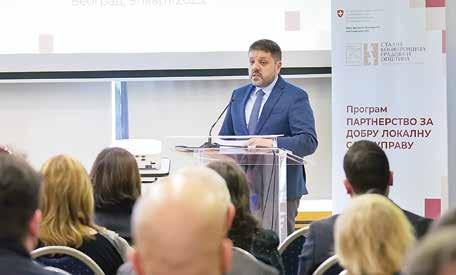
vided a key contribution to improving the ability of the organisation to effectively formulate, represent and advocate for the interests of the local self-governments, but also to contribute continuously to strengthening local capacities in all areas that are under the jurisdiction of local government,” considers SCTM Secretary General Nikola Tarbuk, as well as noting that, thanks to this support, the organisation is today recognised as an active participant and driver of the most significant reform processes in Serbia that
In Switzerland, Serbia’s local governments and the SCTM have found an important partner that understands and recognises the challenges confronting towns and municipalities and that provides continuous support to the development of local government units in Serbia. The results achieved to date through this cooperation between Switzerland and the SCTM show that it is possible and achievable to implement changes that lead to the development of local democracy and the creation of modern, professional and efficient local governments.
cordmagazine.com 15
BUSINESS | STANDING CONFERENCE OF TOWNS AND MUNICIPALITIES (SCTM)
Results achieved to date through cooperation between Switzerland and the SCTM show that it is possible and achievable to implement changes that lead to the development of local democracy and the creation of modern, professional and efficient local governments
Towards a Better Prepared and More Competitive Serbia

Dynamic business environments and constant global challenges require countries and economies be alert and continuously seek out ways to improve their business environment and prospects. On its road to becoming a society of democratic values, as well as to achieving a stronger economic position on the market, Serbia has had the stable support of the Swiss Government. Through numerous initiatives, Switzerland has implemented good business practices locally, including the “Education to Employment” project that’s focused on youth employment and stands out with its success and results
For a full eight years, this successful Swiss-Serbian project has been investing actively in the youth, enhancing their capabilities to better position themselves on the labour market through an exceptionally well-developed system of career guidance and counselling, as well as through training in work-based learning with a known employer. Via this programme, nearly 27,000 young people have so far been empowered, with more than 250 companies engaged in the project. More than 1,600 programme participants have successfully completed work-based learning training, 77% of whom have succeeded in landing their first job. By applying modern technologies, such as VR simulations of work operations in the training process, as well as establishing a strong bond between educational institutions and the business sector and business connections, the project has had a positive impact on
the youth employment climate by offering an exceptionally valuable advantage to them: a career opportunity.
Having recognised depopulation, migration and the lack of a qualified workforce as ongoing challenges across the region, with support of the Chamber of Commerce & Industry of Serbia and the Chamber Investment Forum of the Western Balkans (WB6), the “Education to Employment” project has taken a step further and initiated the organisation of the regional conference entitled “Relevance of Work-Based Learning (WBL) and Social Inclusion for the WB6’s Economic Development”. By bringing together representatives of successful businesses from the six economies, businesspeople from various sectors received the opportunity to share their perspectives on the challenges they encounter and identify common goals they should strive towards. Exchanges of expertise and ideas on formal and non-formal education,
as well as conditions for establishing an inclusive working environment, have created new cooperation prospects, the aim of which is for the entire region to enter the European market better prepared and more competitive.
A constructive discussion among conference participants and panellists was complemented by a VR welding simulation, which was presented publicly for the first time.

In a constantly evolving world that brings new challenges that don’t recognise borders, regional cooperation and youth opportunities are becoming key factors in creating a successful and sustainable future. The “Education to Employment” project, which is supported by the Swiss Government, represents an inspiring example of how investing in knowhow, work-based learning and a fairer and more inclusive environment generates results and is recognised and appreciated.
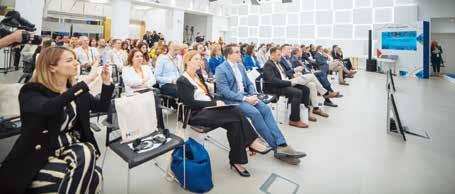
16 SWITZERLAND 2023 16 BUSINESS | IP CONSULT GMBH
Engine Business Leader Maintains Leadership
One of the largest independent technical employers in the aviation sector, this Swiss company has over 2,200 highly qualified employees worldwide and is renowned for its continuous investments in equipment and people, but also for its major investments and new partnerships
spite the growth of the company. The main focus of the engine business and support functions is on the reduction and optimisation of energy consumption in engine testing. At the same time, we invest in a circular economy - together with OEMs, our company continuously introduces new repair capabilities to avoid scrap and resources for the production of new parts.
In April, SR Technics partnered with Kuehne+Nagel and Atlas Air for Sustainable Engine Alliance, members of which aim to reduce their collective environmental impact by building networks for sustainable engine supply ecosystems and offer a portfolio of sustainable services.
SR Technics Services in Serbia provides administrative, financial and technical support services, with the aim of supporting the company’s further growth in all business segments at the global level.
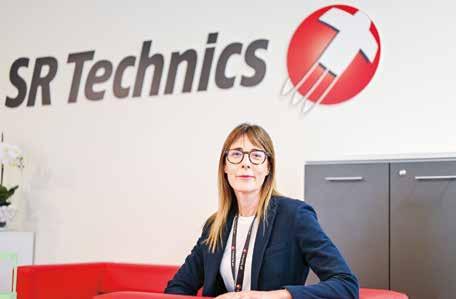
Are there any current or upcoming contracts and projects that would represent an important step forward?
Our company’s target is to double our business over the next five years. We are building infrastructure in Zurich, opening new production facilities and increasing our workforce by around 500 people within the next few years, in order to extend our capabilities for maintenance, repair and overhaul services for the GTF and LEAP engines.
In 2022, SR Technics also partnered with Pratt & Whitney and joined the GTF MRO network, while in April this year we took another new step towards the reac-
tivation of our second test cell at Zurich Airport, and in June we signed a five-year agreement with Safran Aircraft Engines for SR Technics to provide quick-turn maintenance offload support to LEAP-1A engines. With the new LEAP-1A product, we have now taken a decisive step forward in the portfolio of our engine business.
Does improving sustainability occupy an important place in your operations?
Environmental protection is a strategic pillar of SR Technics’ organisation and service portfolio. By extending engine life cycle and delivering best-in-class on-wing performance, SR Technics contributes to the optimised use of resources for its customers and limits the environmental impact of airline operations. We include our employees in this mission.
On the other hand, SR Technics set its global target to reduce absolute CO2 emissions by 2025 from the 2019 baseline de-

Has SR Technics Services Serbia justified the quality epithet attributed to the company worldwide?
The company in Belgrade has around 290 employees supporting the core business, with a growth tendency. In Serbia, we gather a top professional team that’s driven by a passion to acquire new knowledge and that operates daily, in the spirit of teamwork, to improve the level of efficiency and standardisation of our business processes.
The greatest value of SR Technics is our employees. Through various benefits, such as flexible form of work, a tenure incentive scheme, private health insurance etc., we try to ensure that each individual feels good and maintains a balance between their private and business life. We pay special attention to the training of our employees and achieve this through a personal development plan, as well as through other courses that contribute to constant investments in the growth of our employees.
cordmagazine.com 17
BUSINESS | MILENA GAJOVIĆ SHRESTHA GENERAL MANAGER, SR TECHNICS SERVICES
Valuable Swiss Support to Serbia
Helvetas has been present in Serbia since 2015 and currently implements several very important projects while working on a new strategy that will enable it to maintain a strong local presence in Serbia and the region in the coming period
Both the ACT and MED projects deal with citizen participation, though they use different approaches. One works directly with citizens, while the other works through cooperation with local governments. However, they certainly cooperate mutually, exchanging experiences and good practices, and strive to convey the Swiss culture of active citizen participation to Serbia.
Helvetas is an international non-governmental organisation with Swiss roots that has been contributing to transformative changes in Southeast Europe since the early 1990s.
Currently, in addition to two projects (ACT – For an active civil society together, and MED – Accountable Public Finance and Citizen Participation Programme) that are being financed by the Swiss Government, Helvetas also works together with partners on the implementation of the Organic Trade for Development project, supported by SECO, Reconomy, supported by Swedish Government, and the Landscape Fire Management Regional project in the Western Balkans, which deals with climate change and is also funded by the Swiss Government.
ceived them positively. More than forty per cent of Serbian citizens today recognise the effects of their work and believe that they protect the public interest and fight for social change.
ACT – FOR AN ACTIVE CIVIL SOCIETY TOGETHER
The project “ACT- For an active civil society together” is a four-year project supported by the Swiss Government and implemented by Helvetas Swiss Intercooperation and Civic Initiatives
from Belgrade. ACT was launched in September 2019. Its first phase will be completed this September and preparations are underway for the next fouryear phase.
The largest number of civil society organisations in Serbia started their work more than thirty years ago, and until ten years ago only a third of citizens per-
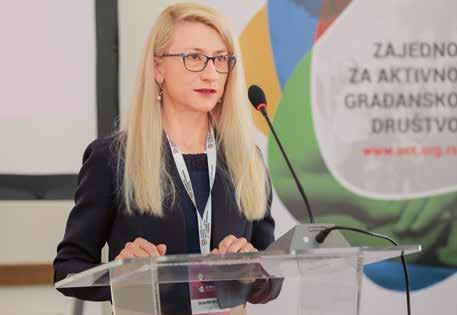
“Despite these positive changes, the general level of engagement of citizens in their communities is still low. At the local level, 15% of citizens participate in some form of decision-making, while at the national level it is only 4%. The initial idea behind launching the ACT project was to make civil society organisations operating throughout Serbia more sustainable and more responsible, thereby empowering and motivating citizens to participate more in the decision-making process, especially at the local level. That’s why, in addition to financial support for the implementation of their initiatives, we also provided them with entire capacity building packages of education and mentorship by excellent experts in the field of communications, public advocacy and citizen mobilisation,” says Snežana Mišić Mihajlović, international team leader of the ACT project at Helvetas Serbia.
During the four years of project implementation, close to 200 civil society organisations from 60 towns and cit-
18 SWITZERLAND 2023 18
BUSINESS | HELVETAS
Snežana Mišić Mihajlović, international team leader of the ACT project, Helvetas Serbia
ies across Serbia were supported, with more than 100,000 citizens benefiting directly from the supported projects and initiatives.
“These organisations engaged citizens in public dialogue, participatory decision-making and advocacy, and several initiated cooperation with local authorities on issues of public importance. Significant changes have been achieved, such as the amendment of the regulations on the representation of women in local communities and the introduction of the green chair at the local level. At the national level, for the first time, women aged over 45 were recognised in the Gender Equality Strategy as being a more difficult to employ category, and the Youth Strategy envisages the development of youth responsible budgeting. Many of them can today more legitimately represent citizens and better mobilise people, while they are also able to express their needs and be heard by the authorities,” concludes Gorana Radovanović, adviser on the ACT project at Helvetas Serbia.
MED - ACCOUNTABLE LOCAL FINANCES AND CITIZEN PARTICIPATION PROGRAMME
Helvetas believes that social cohesion is crucial to creating a strong society, promoting unity, interconnectedness and a shared identity. This cohesion fosters trust, support and stronger relationships, fostering economic prosperity and promoting collaboration, innovation and collective progress.
This is why Helvetas responded positively to the elevated demand of the Government of Serbia to implement the Swiss supported MED Programme in over 60 local governments across Serbia. MED fosters the social contract between citizens and local governments by promoting efficient taxation on the governments revenue side and participatory decision making on the expenditure side.
Within the scope of the MED Programme, which is supported by the Gov-
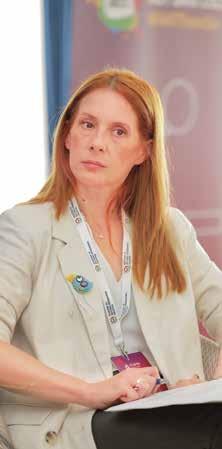
ernment of Switzerland, technical assistance and financial support have been provided to local governments accross Serbia that are committed to supporting projects proposed by citizens through special budget allocations. Almost a million euros was allocated for these projects, 60% of which was allocated from the local budgets of municipalities and cities, with 40% co-financed by the Swiss Government. A total of 149 projects were submitted, proposed by informal groups of citizens comprising a total of 2,858 families who have settled their property tax obligations.
“In the area of improving local public finances in the MED Programme, the Swiss Government finances the hiring of additional associates to work in local tax administrations, for which funds of 480,000 CHF have been pro -

vided and more than 100 people have been hired to date. In the previous period, local governments supported by the Programme managed to increase the total collection of their own-source revenues by 30%, thereby securing additional funds to finance local priorities from their budgets. Considering that these are important local services, the Swiss Government also helps both the improvement and development of digital services in this segment, with the aim of facilitating the availability of public services to citizens,” says Alexander Grunauer, team leader at MED, Accountable local finances and citizen participation.
With its MED Programme, Helvetas is a partner of Serbia in its efforts to construct a strong society that combines social cohesion, citizen participation, collective decision-making, efficient and transparent taxation, and economic prosperity. By nurturing these interconnected aspects, Serbia can create an environment where individuals thrive, communities prosper and a collective sense of wellbeing is achieved.
cordmagazine.com 19
Helvetas believes social cohesion is crucial for a strong society, promoting unity, interconnectedness and a shared identity
Gorana Radovanović, adviser on the ACT project, Helvetas Serbia
Aleksander Grunauer, international Team leader MED, Accountable local finances and citizen participation, Helvetas Serbia

Time Travel in Müstair Valley
Müstair lies at the farthest corner of Eastern Switzerland. Its mild climate, unspoilt nature, cultural landscapes, 1,300-year-old monastery and numerous possible activities, make Müstair a very attractive holiday resort.

Focused on Growth and Innovation
Over its initial decade of operations, PRODYNA has faced numerous challenges and undergone significant upgrades, showcasing extensive experience in IT consulting. Thanks to team spirit and the dedication of its employees, partners and clients, PRODYNA has managed to achieve its goals and leave a positive impression on the market
has been one of growth, learning and inspiration, and we eagerly anticipate the opportunities that lie ahead.
We happily look to the future, which will certainly bring us more loyal clients with new and challenging projects, enabling us and our employees to grow together ~ announces PRODYNA MD Simo Vuleta.

We would like to start this interview by congratulating you on the company’s 10th birthday and wishing you much success in the decades ahead. Did you manage to fulfil the plans you set out with for this first decade of operations?
Thank you very much for the congratulations. This really is a special moment for us, because 10 years of operations, dedication and effort is not just
The name PRODYNA is a lexical blend of PROfessional and DYNAmic. Has your name tracked your journey to success?
The name PRODYNA is more than symbolic, because we constantly strive to provide professional services that satisfy our clients’ specific needs and challenges. By remaining dynamic, we are able to adapt quickly to evolving market trends and the preferences of clients, which ensures that our solutions remain superior and relevant.

Our name represents the way we relate to our customers, but it also defines our internal culture. We nurture a working environment that enables our employees to advance professionally and
Absolutely, our determination to offer every client the best solution has truly been one of the key reasons behind our broad portfolio of services and rich experience. We essentially believe that our success has been connected closely to the success of our clients. Such a customer-centric approach has been the driving force behind our growth and has made it possible for us to establish a wide array of services.
a number, but rather a symbol of success and continuous progress. We are proud of our achievements to date, but that won’t prevent us from endeavouring to make even more. Our vision remains focused on continuous growth, innovation and providing our clients with unparalleled value.
The first decade of our operations was outstanding, but we are ready to do even more in the period ahead. The journey
personally. By embracing dynamic work, we encourage lifelong learning, growth and the development of skills, thus enabling our team members to take on challenges with agility and expertise.
Your determination to provide every client with the best solution is beyond question. Is that one of the reasons you can boast of having a broad portfolio of services and rich experience?
Our commitment to providing each client with the best solution means that we don’t believe in one-size-fits-all approaches. We allocate time to develop an understanding of the unique needs and challenges of every individual client, adapting our services to suit their specific requirements. It is this personalised approach that has earned us the reputation that we enjoy, while it has also resulted in a diverse portfolio of successful projects. We have amassed a wealth of experience in adapting to changing technologies, market trends and client preferences, and our desire to take on new challenges shows that we are learning and expanding our expertise constantly. By consistently providing outstanding solutions and exceeding expectations, we have built strong and enduring partnerships with our clients, who return to us with new projects, but also recommend us to their partners.
22 SWITZERLAND 2023 22
BUSINESS | SIMO VULETA MANAGING DIRECTOR AT PRODYNA,
MEMBER
We have amassed a wealth of experience in adapting to changing technologies, market trends and client preferences
SSCC BOARD
Connecting the Region with Global Ports
The journey of Mediterranean Shipping Company, MSC, began more than half a century ago, with a fleet consisting of a single vessel. The company has since grown to become a world leader in shipping and logistics, able to offer best-in-class transport solutions, optimal transport routes to anywhere in the world and a portfolio of solutions to support customers’ supply chains at every stage
The Serbian market provides significant potential to strengthen our company’s position locally and regionally, and we will continue to improve our services by listening to customers and investing in the key business areas needed to optimise their supply chains, says MSC’s regional MD Stevica Čarapić.

MSC is well known globally, but we would like to know what the regional office’s journey has looked like since it opened back in 2005?

MSC started with just one vessel, while today it carries approximately 22.5 million TEU annually through its network of 675 offices in 155 countries, calling at 520 global ports. Opening our regional office covering Serbia, North Macedonia and Montenegro was an important strategic decision. Despite challenging beginnings, we have managed to position our company as the logistics leader on the Serbian and regional markets, thanks to constant support from our headquarters and our local team of dedicated professionals. Our services include a wide range of transport solutions for both imports and exports, with global port coverage, as well as pick-up and delivery, which is crucial in landlocked countries like Serbia and North Macedonia.
The world has faced numerous challenges over the past three years, with the logistics industry among the hardest hit. What was your response to the crisis?
As a response to increased demand, MSC invested in its equipment and fleet, attempting to minimise the impact of global congestion caused by the Covid-19 pandemic. Locally, MSC Serbia concentrated on providing the best possible service for customers via its local office and regional intermodal links. We also invested in our reefer container capacity in order to serve the increased demand for fruits from the Serbian region.
The MSC service covers all ports of the region – Rijeka, Koper, Bar, Ploče, Thessaloniki, while part of the cargo is transported via Italian and North European ports, due to their direct services to the U.S. and Canada, and we can of-
fer the best possible transport solution from/to Serbia at any time.
The past three years have also highlighted the importance of digitalisation, and at MSC we are continuously investing in developing new digital tools and technologies to provide customers with easy-to-use, flexible and reliable online shipping management solutions. Our transport and digital solutions are also tailored to help customers decarbonise their supply chains.
You are known on the market for your personal approach to every client, regardless of their scope of business. Is this something you’re proud of?
Yes, we insist on a personal approach to every client, and our goal is to build long-term partnerships with our customers. We are constantly listening to their needs and planning our activities accordingly. As an example, take the support we are providing to clients with temperature sensitive goods, as I mentioned earlier. Our reefer container experts are always at their disposal and we conduct regular reefer education sessions, where fruit and vegetable exporters learn about proper packing, loading, temperature and ventilation settings to ensure sensitive cargo remains fresh from pick-up to delivery.
Our personalised approach provides a single point of contact for our customers’ supply chains - whether that’s moving their goods, helping with their customs clearance or providing our Peace of Mind insurance Solutions.
cordmagazine.com 23
BUSINESS | STEVICA ČARAPIĆ MSC REGIONAL MANAGING DIRECTOR (SERBIA/MONTENEGRO/NORTH MACEDONIA)
Innovation is the Driving Force
Headquartered in Zurich, gategroup delivers operational excellence through the most extensive catering network in the aviation industry, catering ca. 3,3 million flights for 300+ global aviation customers and serving more than 520 million passengers in 2022 from over 200 operating units in over 60 countries across all continents

24 SWITZERLAND 2023 INTERVIEW | DR MATTHIAS FUNK MANAGING DIRECTOR AT GATEGROUP SERVICES D.O.O. BELGRADE
The process from Board Approval of the concept in May 2019 to company registration in Serbia took only two months, with operations launched just three and a half months later. The company has experienced growth of partly over 100 new employees in one year, advancing from 20 employees on the first day to over 300 employees today. And gategroup isn’t planning to stop there.
Your company has spent decades as a leading global player in airline catering, retail and hospitality products and services. You serve hundreds of millions of passengers worldwide each year. Thank you for highlighting our company’s long-standing presence and leading position on the global market for airline catering, retail, and hospitality products and services. Indeed, gategroup is the global leader in airline catering, retail-on-board
course of 2022, the company rehired more than 5,000 employees, bringing its workforce back to 90% of its pre-COVID numbers. We ramped up all our operating units and nearly doubled in size compared to 2021, recording revenues of CHF 3.9 billion and increasing our EBITDA by 65.5% to CHF 100.1 million.
Innovation is the driving force behind progress and growth in today’s rapidly evolving business landscape. By embracing innovation, we continuously seek new and improved ways to deliver products, services and solutions to our customers. This mindset enables us to stay ahead of the competition, meet changing customer needs and explore untapped markets.
For example, deSter, one of our four gategroup family members, is a leading provider of innovative food packaging and serviceware concepts to the aviation and food service industries. By combining over 40 years of industry experience with
erences and anticipating their expectations. By constantly seeking feedback and engaging with our customers, we gain valuable insights that help us shape our products, services and experiences to meet and exceed their expectations;
• Continuous Improvement: we believe in an iterative approach to improvement. We are constantly analysing customer feedback, monitoring industry trends and evaluating our performance. This allows us to identify areas requiring enhancement and make necessary adjustments to ensure we are consistently delivering high-quality experiences. By embracing a culture of continuous improvement, we can adapt and evolve in line with our passengers’ changing needs.
and hospitality products and services. In 2022, gategroup achieved CHF 3.9 billion in revenues generated by more than 38,000 employees worldwide.
Over the years, we have honed our expertise, expanded our operations and developed strong partnerships to meet the diverse needs of passengers across the globe. Our leading position in airline catering, retail, and hospitality products and services is a result of our industry expertise, global reach, commitment to quality and safety, innovation, sustainability efforts, customer focus and strong partnerships. We strive to exceed passenger expectations and contribute to a seamless and memorable travel experience for millions of passengers worldwide.
What role is played by innovation and advanced technological solutions in your company’s positive business results, but also your good reputation?
I appreciate that you acknowledge our positive business results and the good reputation of our company. During the
a passion for design and service trends, we deliver bespoke, customer-centric and impactful innovations.
Through dedicated research and close collaboration with our customers, we keep our finger on the pulse of today’s market. We are thereby able to deliver functional and attractive products that don’t only deliver on today’s requirements, but also anticipate the needs of tomorrow.
Your business philosophy is very simple in that you always prioritise the passenger – though this doesn’t necessarily mean that meeting their expectations is easy. But you nonetheless succeed in doing so... How?
Meeting customer expectations is indeed a challenging task, but we strive to succeed by following a few key principles:
• Customer-Centric Approach: we place the passenger at the centre of everything we do. This means actively listening to their needs, understanding their pref-
• Collaboration and Partnerships: we recognise that meeting passenger expectations requires collaboration not only within our organisation, but also with external partners. We work closely with our suppliers, vendors and other stakeholders to ensure a seamless end-to-end experience. By building strong partnerships, we can leverage collective expertise and resources to deliver exceptional value to our passengers.
Gategroup Services established its Belgrade operations in 2019 as SSC of the group with global positions in Finances, IT, Legal & Compliance, Administration etc. Are you satisfied with the results achieved over the previous four years? Extremely satisfied! I still cannot believe how fast everything went. From Board Approval of the concept in May 2019 to company registration in Serbia took only two months, and we launched operations just three and a half months later, on 1st November 2019. We’ve experienced growth of partly over 100 new employees in one year, progressing from 20 employees on the first day to the over 300 employees that we have today. And we’re not planning to stop there.
But what were the reasons for our fast growth and positive results? Of course, the fact that gategroup acquired SkyChefs from Lufthansa and consolidated our Shared Services landscape in 2021 was a significant contributor. A major role was
cordmagazine.com 25
By combining over 40 years of industry experience with a passion for design and service trends, gategroup delivers bespoke, customer-centric and impactful innovations
also played by the insourcing of our IT services, which we have been providing since 2022 from our Belgrade office. However, I think the biggest contributor to our success is the excellent service we provide to our customers in 15 countries across Europe.
We have been creating a regional talent pool and I am proud to be able to say that we are providing employees with the opportunity to develop personally and improve their career prospects within the SSC, but also beyond its boundaries.
Is it true that, when times are at their toughest, everything depends on a good
team, organisational culture, the motivation of employees etc.?
That’s correct – as we were confronted by one of the biggest crises in our industry just a few months after SSC was established, we were unable to develop our strategy in the way we’d planned. We were then focused mostly on non-material benefits that we could offer our employees (working time flexibility, working from home etc.) and being flexible with all the “small things” that can make employees happy. During those times, employees had to work even closer together, support each other and communicate
We’ve ramped up all our operating units and nearly doubled in size compared to 2021, recording revenues of CHF 3.9
billion and increasing our EBITDA by 65.5% to CHF 100.1 million

openly to find innovative solutions, adapt to changing circumstances and overcome obstacles. And today the company still benefits from the organisational culture that was established during those times and its positive team spirit.
While we’re on the topic of challenges, what forms the basis of your future plans? After the enormous growth that we’ve experienced year-on-year since our office was opened, our goal for 2023 is to focus more on improving our current processes, our visibility on the market, building long term relationships and keeping our employees motivated. We are also trying to share good practices and the experience we gained with other parts of our
business. On the other hand, investment in advanced technology and embracing advanced technological solutions is essential to remain competitive and to satisfy evolving customer expectations. We continue to evaluate the potential value of artificial intelligence and machine learning as a tool for automating internal and customer-centric processes, such as accounts payable/accounts receivable management, permanent inventory and predictive analytics. In addition, we are monitoring advances in data mining that can create opportunities to further customise final customer experiences.
26 SWITZERLAND 2023
By embracing innovation, we continuously seek out new and improved ways to deliver products, services and solutions to our customers
Sika Serbia –Absolute Leader

A pioneering spirit, teamwork and commitment comprise the essence of the Sika brand and Sika as a company, while innovation is among the core values that have formed the basis of this company’s operations for more than 110 years. That’s the Sika recipe for success
Since 2015, Sika has opened 44 new factories and completed 25 acquisitions, including its acquiring of MBCC Group, one of the world’s leading suppliers of construction chemicals. Here Sika General Manager Dragan Gavrilović explains how important this news is for the company, but also for the industry as a whole.
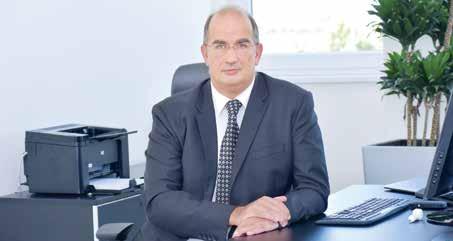
What is your recipe to carve out a leadership position in global business and on each individual market?
We’ve built our corporate culture in such a way that it is positive for both our business and our employees. We endeavour to ensure that innovation is one of the core values on which we base our business and build better, more sustainable and different solutions in the construction industry. The courage to engage in experiments and push the boundaries of development, and daring to be the first in innovative solutions, deserve the credit for our epithet as a pioneer. And none of this would have been
possible without the dedication of our experts and the collaborative teamwork that our company nurtures and encourages. In this era of rapid and major technological change and innovation that changes our lives, habits, needs and expectations on a daily basis, companies must be even more adaptable, flexible and innovative in preserving their market positions, but we believe that high-quality people, as a key resource, as well as consistency in the implementation of our mission, contribute to us
building and maintaining our leadership position on numerous markets worldwide.
You are known for your acquisitions. How does this most recent one differ from the norm?
Permanent growth and development are imperatives for us in business, and as such the acquisition of successful, reputed companies with established operations on certain markets certainly enables us to develop and improve our operations on certain markets or in certain market segments. Making the acquisition of the MBCC Group different and more challenging for us is its global character. With this acquisition, apart from strengthening Sika’s personnel, knowhow, expertise and product range, our company also received an opportunity to join forces with the MBCC group to contribute to the even higher quality provision of services and experiences to our clients and partners. From 2nd May 2023, Sika and the MBCC group have joined forces worldwide, including in Serbia, with Master Builders Solutions d.o.o. having become part of Sika Serbia, and we believe that we will complement each other perfectly on this joint business venture and provide an even better contribution to satisfying all the demands and needs of the market and consumers.
Is the ecological dimension of sustainable development an important aspect of your business?
We are aware of our environmental impact and that’s why we always research new technologies that will help us reduce the negative environmental impact of construction projects. We work tirelessly and with dedication to developing solutions and producing construction materials that support sustainability and environmental protection, or that are eco-friendly, energy efficient and sustainable over the long term. We believe that sustainability is the path to the future and preserving our planet for future generations, and that we have a responsibility to take steps along that path. We encourage everyone to take small steps towards sustainability – from recycling and saving energy, to supporting local environmental initiatives, because together we can all build a better and more sustainable future.
cordmagazine.com 27 BUSINESS | DRAGAN GAVRILOVIĆ, GENERAL MANAGER, SIKA
The courage to engage in experiments and push the boundaries of development, and daring to be the first in innovative solutions, deserve the credit for our epithet as a pioneer
Transferring Knowledge and Technology is Key to Success
Produkt BG Inženjering is a domestic Serbian company which has, thanks to its partnership with a Swiss giant, achieved average annual growth of 25 per cent and an annual turnover of five million euros over the last eight years

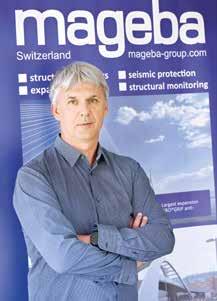
New perspectives and potentials opened up with the signing of a contract with civil engineering company Mageba on the licensed production of bearings and expansion joints for bridges, as well as a contract on the distribution of other products in the Mageba range.
The beginnings of your company date all the way back to year 1991, while a new period of your operations is linked to 2015, when you formed a partnership with Swiss company Mageba. You have a long road behind you, a long but successful one...
Produkt BG Inženjering emerged out of the restructuring of the “Produkt” business cooperative, which dealt, among other things, with the production and installation of products for bridges, primarily bridge bearings, expansion joints, drains and steel structures.
We were already narrowly specialised in these products prior to the partnership, and we participated actively in the construction and restoration of bridges in the country and around the region. That contributed massively to us gaining the trust of an important partner and taking a big stride forward.
Thanks to this, our employees have access to the latest technologies, as well as an opportunity to use solutions and experiences arising from the most demanding projects on the planet. I can now state unreservedly that the transfer of knowledge and technology is the key to our success; that we are the first and leading company in Serbia specialised in the production and
distribution of all types of bearings and expansion joints for bridges, while we are also the only domestic manufacturer certified according to the highest standards.
It wasn’t easy for you to harmonise with the standards of Swiss quality, but that is no longer an issue. Are you fully adapted?
With five of its own production plants and 20 affiliated ones, of which we are one, Mageba is a successful global player in the industry, with core values based specifically on quality and commitment. Its products are included in more than 25,000 bridges worldwide.
This all shows what a giant it is, so it’s no wonder that we needed almost two years to raise our processes to Mageba standards. With their assistance and our own tenacity, we went through many certification processes and now regularly place our products on the demanding EU markets. All technological processes, employees, as
well as equipment and materials, are subjected to standardised procedures, with compliance and consistency controlled quarterly by Germany’s stringent MPA institute from Stuttgart. Harmonisation is really no longer an issue, as everything is now in order and these controls unfold without disrupting production processes. We export as much as 70 per cent of our production and can boast of the fact that 80% of all Mageba products ordered in the region today are produced at our factory in Serbia. We thereby not only raise our own quality and productivity, but at the same time “power” both our suppliers and subcontractors.
In the year when you signed the contract with Mageba, your turnover totalled around a million euros. How is it today? Our annual turnover today totals five million euros. We cannot be dissatisfied, on the contrary, we have grown by an annual average of more than 25% over the last seven years. This is exceptionally fast growth for a small company, and it was achieved thanks to the fact that we invested in both production capacity and personnel. Our plant for the final assembly of products covers 800m2, and that is followed by the plant for anti-corrosion protection encompassing 500m2, as well as the 300m2 plant for processing semi-finished products. We’ve also expanded the yard to more than 3,000 square metres of open workspace.
I’m particularly proud of our team, which today comprises 42 employees, well-trained and high-quality people, including seven highly specialised engineers. They constantly complete training programmes, so the quality of our products and services remains at an expected high level.
28 SWITZERLAND 2023 INTERVIEW | OLEG STEFANOVIĆ MANAGING DIRECTOR, PRODUKT BG INŽENJERING
Support for Regenerative Agriculture
Within the scope of the Nestlé corporation, Serbia became the first country in the region – back in 2021 – to start applying the practices of regenerative agriculture, with the aim of reducing the agriculture sector’s negative impact on the environment


Our vision is to source 20% of key raw materials from regenerative sources by 2025 and by as much as 50% by 2030” ~ they say at this famous Swiss company with a name that’s synonymous with quality.
What is regenerative agriculture and how are the benefits of sustainable agricultural practices reflected? Trends in agriculture have for many years been oriented towards increasing yields, while there has been a lack of thought about the kind of impact it has on the soil and other natural resources. As a result, agriculture has become a worse polluter than the energy sector, with harmful gas emissions of as much as 24%. Regenerative agriculture is oriented towards increasing the proportion of organic matter and retaining moisture in the soil, thus protecting biodiversity and preserving the environment. Key practices include cover cropping, the use of organic fertilisers, afforestation, as well as the application of precision agriculture with the use of drones – all of which has a positive impact on reducing emissions of harmful gases that contribute to climate change. The fact that the soil retains large amounts of organic matter also reduces its erosion and loss of moisture. And because it implies less fuel and fertiliser consumption, as well as the engaging of fewer people, the concept also yields positive economic effects.
How do you, as a company, contribute to the building of a sustainable food industry?
The principles of regenerative agriculture have been implemented in our country since the year before last, when the programme included the largest producers of vegetables for our product Začin C, and this year we expanded the network of suppliers to include local sunflower growers. We provide strong support to local sup-
dried vegetables by adhering to the principles of regenerative agriculture, recently – thanks to a partnership with Victoriaoil from Šid – this programme has been expanded to also include local growers of sunflowers, which will be processed into oil at the Victoriaoil plants. In the fields of Raca d.o.o. from Kumane, Borac AD from Šurjan and Agroprodukt d.o.o. from Bumbarevo Brdo, we already have cultivated sunflowers that were planted and
pliers of raw materials that are essential to our production operations, both through financial investment and through examples of good practice that are applied successfully worldwide. Our vision is to transform Serbia into a hub of regenerative agriculture and to improve our country’s export potential. We are striving for 20% of key raw materials to come from regenerative sources by 2025, and as much as 50% by 2030.
Who are your partners and what are all the products you’ll make using oil from regenerative sources?
After Geneza from Kanjiža and Telek Paprika from Martonoš, which produce
processed using the strip-till technique, which implies minimal tillage with the aim of preserving the health of the soil by retaining a high proportion of organic matter.
Those quantities are enough to produce around 750 tons of sunflower oil, which can be used to produce around 3.4 million units of Thomy mayonnaise and sauces. This means that, from as early as this November, we will be able to use part of the raw materials obtained according to sustainable principles to make these products, and our future plan is for the entire production of the Thomy portfolio to be based on sunflower oil from regenerative sources.
INTERVIEW | MARJANA
DAVIDOVIĆ, GENERAL MANAGER AT NESTLÉ ADRIATIC HUB SOUTH (SERBIA, MONTENEGRO, NORTH MACEDONIA)
cordmagazine.com 29
We provide strong support to local suppliers of raw materials that are essential to our production operations, both through financial investment and through examples of good practice
Rapid Economic Growth is Based on Innovation
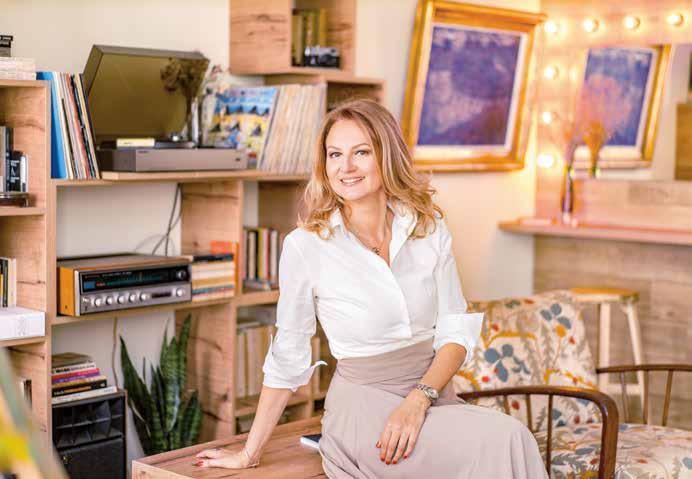
The utilising of new technologies, the strengthening of links between the education system, research work and industry, which is at the essence of creating a strong startup ecosystem, as well as the operations of the ICT sector, represent some of the most important topics for exchanging experiences at the gatherings of SSCC members
There are numerous member companies of the Swiss-Serbian Chamber of Commerce operating in the IT sector, such as Zühlke Engineering, Merkle, Prodyna, Sky Express, Codetribe and InterVenture, among others. This naturally ensures their great interest in bringing the areas of digitalisation, IT and artificial intelligence into the thematic focus of the Chamber, says SSCC Executive Director Ana Grujović in this interview.
Statistics actually show that, in the area of trade in services, Switzerland is Serbia’s 4th biggest partner in terms of the total volume of exchange, with ICT services providing a significant contribution to that total. This is why the SSCC established its Working Group on Digitalisation, which held its first meeting this June. “During discussions with member companies, artificial intelligence proved to be a hot topic, both in the aspect of legal regulations and its use for conducting daily business activities,” says Grujović.
30 SWITZERLAND 2023 INTERVIEW | ANA GRUJOVIĆ EXECUTIVE DIRECTOR OF THE SWISS-SERBIAN CHAMBER OF COMMERCE, SSCC
Alongside this initiative, May 2023 also saw the staging of a seminar on the topic of Human Resources and legal difficulties confronting the IT sector, which was organised in cooperation with SSCC member company TSG Law office. “This event enabled participants to discover more about the challenges confronting IT companies in Serbia as a result of the latest global events that are being increasingly reflected in our market, including the implications of using Chat GTP for the way work is done and employees are motivated,” says Grujović. Finally, during the June webinar, “The SSCC’s partner from Zurich, the Switzerland-Central Europe Chamber of Commerce (SEC), presented ways companies can increase productivity with a suitable corporate strategy on the use of artificial intelligence,” explains our interlocutor.
What are the “eternal topics” and in which areas are companies’ new interests?
Due to the topical nature of individual themes, certain events will become regular in the plan of SSCC activities. One
We are also continuing the series of webinars on the topic of cyber-security in cooperation with member company Sky Express, which aims to ensure the protection and security of company information.
The new interests of companies are in the field of green transition: the struggle to combat climate change, decarbonisation, the use of renewable energy sources, the applying of new and sustainable technologies in business operations, protection of the natural environment etc. Among the invaluable experiences of Swiss companies, I would single out company ABB, a technological leader in the field of electrification and automation, which enables a more sustainable future with
When it comes to the Chamber’s activities, they are implemented regularly in collaboration with member companies, colleagues from other bilateral chambers and business associations, as well as with institutional partners from Switzerland. I would emphasise in particular the importance of the gatherings of SSCC members that provide new member companies with opportunities to present their business activities and fortify their connections with the business community of the Swiss-Serbian Chamber. Among the most recent companies to become SSCC members I would mention gategroup, Nicoll Curtin and the Winsedswiss Education Group.
From the perspective of the need to advance the business climate in Serbia, what do your members single out as the most important issues requiring discussion with public policymakers? Legal certainty is crucial. All investors need to feel that sense of certainty, both potential investors and those already present on the domestic market. The results of the SSCC survey on the business climate showed that the majority of surveyed companies expect further changes when it comes to the efficiency of the work of public institutions, administration and the application of legislation, as well as in the area of ensuring legal certainty.
such case is the working lunch under the heading “Start-up ecosystem in Switzerland - key success factors”, which was organised last October in cooperation with SSCC member company Holycode. The key success factors for the ecosystem that were cited at the time include the capacity for innovation and adaptation, which is put into practice every day by start-up companies that are often at the very forefront of innovation. Interconnectivity between higher education institutions, research work and industry is supporting the development of an innovative and dynamic start-up ecosystem in Switzerland. We are planning another working lunch for this year that will address the topic of Swiss experiences in the fields of fintech, medtech and ICT, with guest lecturers from Switzerland.
the efficient use of resources, as well as Nestlé’s regenerative agriculture initiative, which aims to preserve and maintain agricultural land.
Has the slowdown in economic growth, both globally and locally, impacted on the number of inquiries that you receive from potential Swiss investors and the general activities of the SSCC?
Periods of economic growth slowdowns are nothing new; those are periods when companies consider, among other things, conquering new international markets. I would cite one example from the machining and metal processing sector: this February’s official opening of the Kruševac factory of Swiss company Etampa.
The area of CSR has been changing dynamically over recent years, with an increasing number of topics in the focus of companies’ concern – from the green economy, to labour rights and human rights. To what extent is this area in the focus of CCSS activities and the informing of members?
Business has a broad influence in society and is also able to contribute to advancing human rights in various ways. The ways companies can positively influence human rights is becoming a high priority topic. That’s also the reason SSCC member companies are invited to participate in the Swiss Forum “Economy and Human Rights”, which is to be held in Bern on 18th October 2023 and is being jointly organised by the Swiss State Secretariat for Economic Affairs (SECO) and the Swiss Federal Department of Foreign Affairs. (FDFA).
cordmagazine.com 31
There are many SSCC member companies operating in the IT sector, and thus digitalisation continues to represent an area of great interest to them
Switzerland is Serbia’s 4th biggest partner in the area of trade in services, with ICT services providing a significant contribution
Eventful Year
So far, 2023 has proved to be an eventful year for the Swiss-Serbian Chamber of Commerce, filled with numerous exciting gatherings, workshops and achievements, while the SSCC has also managed to introduce two new special membership packages.


JULY 2023
SSCC SUMMER BUSINESS COCKTAIL PARTY
This year’s SSCC Summer Business Cocktail Party was hosted by IT security company Sky Express and brought together around 50 guests. It was held, as is tradition, at Belgrade Waterfront’s La Cucina restaurant.
Speaking on this occasion, SSCC guest of honour H.E. Ambassador Urs Schmid presented the main conclusions of the 11th session of the Swiss-Serbian Joint Economic Commission, which was held in Bern on 7th June.
SSCC President Majo Mićović announced the association’s upcoming activities, including the expansion of the SSCC network with the addition of institutional partners in Switzerland, meetings of the SSCC Working Group on Digitalisation, as well as the results of the recent survey of the local business climate. He also noted that the SSCC had, based on his initiative, helped in the establishing of the Swiss-Montenegrin Chamber of Commerce.
JUNE 2023
FIRST MEETING OF SSCC WORKING GROUP ON DIGITALISATION
The first meeting of the SSCC Working Group on Digitalisation was held on 13th June 2023, on the premises of member company Roche d.o.o. The main topics of discussion addressed by participants included artificial intelligence and its current regulatory framework, cyber-security and data protection, investment in R&D and new technologies, particularly in the fields of agriculture and the healthcare system, and the digital transformation of companies. The next meetings have been scheduled for autumn 2023.
32 SWITZERLAND 2023 32 ACTIVITIES | SSCC
SSCC Vice-President and Roche d.o.o. General Manager Ana Govedarica, with SSCC President and Sky Express d.o.o General Manager Majo Mićović
MAY 2023
WORKING
BREAKFAST: HR & LEGAL CHALLENGES IN THE IT SECTOR
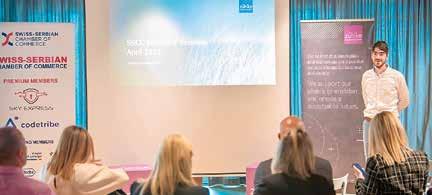
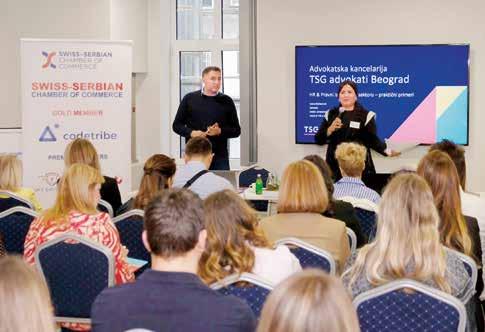
May’s SSCC Working Breakfast on HR & the legal challenges facing the IT sector was organised in cooperation with SSCC member company TSG Law office and gave participants an opportunity to find out about the current challenges confronting IT companies in Serbia due to the latest global events that are being increasingly reflected on our market. The very dynamic discussion held during this working breakfast led to an additional event on this topic being held in June 2023.
APRIL 2023
SPEED BUSINESS MEETING
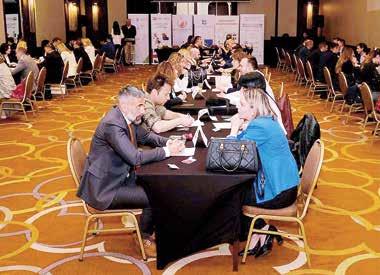
A Speed Business Meeting held on 24th April included the participation of members of six bilateral business associations: the Swiss-Serbian Chamber of Commerce, the British-Serbian Chamber of Commerce, the Slovenian Business Club, the Croatian Business Club, the Hellenic Business Association of Serbia and the Belgian-Serbian Business Association. The event brought together over 70 representatives of member companies from various business sectors. During 10 eight-minute “one-on-one” meetings, the participants had the opportunity to quickly and efficiently present their companies to potential partners, exchange information and consider opportunities to cooperate more closely.
APRIL 2023
SSCC MEMBERS’ REUNION
The SSCC Members’ Reunion was hosted by member company Zuehlke Engineering and included presentations by companies Zuehlke Engineering, Winsedswiss Education Group and Nicoll Curtin. The official section of the event was followed by a networking cocktail reception that gave SSCC members an opportunity to exchange business ideas and explore potential business partnerships.
cordmagazine.com 33
Ivana Stefanović, TSG partner and attorney at law, and Dušan Jovanović, Head of HR at sa.global
Nebojša Ristin, Country Lead Head of Digital Experience, Zuehlke Engineering d.o.o.
MARCH 2023
SEC SWISS IMPULSE SESSIONS WEBINARS

A webinar entitled ‘Metaverse, Virtual Worlds, NFTs & Communities’ was held in cooperation with the Chamber of Commerce Switzerland – Central Europe (SEC) and included guest lecturer Robert Iken, founder of Morrow Ventures from Jung von Matt, one of the leading advertising agencies in Europe. SEC was founded as a non-profit organisation in Zurich in 1999 and has since grown to include 17 countries from the region of Central and Eastern Europe (CEE).
MARCH 2023
CYBER SECURITY TRAINING INTENDED FOR ALL EMPLOYEES
In cooperation with SSCC member company Sky Express d.o.o., a webinar entitled ‘Cyber security training intended for all employees’ was held in March 2023. Companies suffer their most serious data breaches due to a lack of adequate employee training. This webinar offered a free-of-charge opportunity to upgrade the cyber-security knowledge of all employees and prevent companies from being subjected to cyber-attacks.

APRIL 2023
SSCC BUSINESS CLIMATE SURVEY 2023

The SSCC Business Climate Survey in Serbia 2023 was conducted among the members of the Swiss-Serbian Chamber of Commerce in April. The results of the survey are intended to provide insight into the SSCC business community’s confidence in the Serbian market and an understanding of the main challenges they face and concerns they have. Most of the survey respondents (71.43%) rated the current business climate in Serbia as satisfactory. They also expect conditions for doing business in Serbia to remain unchanged compared to last year, according to a majority of surveyed companies drawn from the SSCC business community. More specifically, 17.86% expect the business environment in Serbia to improve in 2023 compared to 2022, while 53.57% of respondents believe it will remain the same as in 2022. The results also showed that the majority of surveyed companies expect to see further improvements to the business environment in the following areas: public institution efficiency and administrative procedures, law enforcement, and ensuring legal security and stability.
With regard to the development of digitalisation in Serbia, surveyed respondents assessed e-banking as the most satisfactory area and e-procurement as the least satisfactory. Finally, a majority of surveyed companies expressed satisfaction with SSCC’s work with regard to its plan of activities, communication and transparency.
UPCOMING: OCTOBER 2023
SWISS FORUM “BUSINESS AND HUMAN RIGHTS”, BERN, SWITZERLAND
The Swiss State Secretariat for Economic Affairs, SECO, and the Federal Department of Foreign Affairs, FDFA, in collaboration with the UN Global Compact Network Switzerland & Liechtenstein, are organising the Swiss Forum “Business and Human Rights”, which will take place in Bern, Switzerland, on Wednesday 18th October, 2023. The Forum aims to promote good practices and raise awareness of human rights due diligence among Swiss companies. The Forum will provide information on current legal requirements and the expectations of the Federal Council, as well as offering a unique opportunity for companies to exchange good practices. Representatives of business, leaders from different sectors, policymakers, academics and civil society experts are invited to discuss, debate and present their approaches to pressing human rights issues.

34 SWITZERLAND 2023
SWITZERLAND 2023
FEBRUARY 2023
SSCC GENERAL ASSEMBLY 2023
On the occasion of the SSCC General Assembly 2023, SSCC President Majo Mićović presented an overview of Swiss-Serbian economic relations. The achievements of the association in 2022, plan of activities for 2023 and financial reports were all presented to members and adopted unanimously by the SSCC Assembly.
UPCOMING:

NEW:
OCTOBER 2023
SSCC GOLD AND PREMIUM MEMBERS 2023

The SSCC has introduced two new special membership packages: SSCC Gold member package, and SSCC Premium member package. Both packages offer the possibility for increased corporate visibility, together with many other options for promoting member companies!

Strong Partner with Precious Experience
Switzerland, which has been ranked world champion according to the Global Innovation Index for 12 consecutive years and which tops the list of the world’s most competitive countries, represents the best role model for Serbia and the best example that the most innovative economies are also the most competitive, and that investment in research & development, knowledge and innovation, and linking those investments to the economy, represents one of the main pillars of market success and sustainable development
There are ever-more high-tech Swiss companies operating on the Serbian market and ever-more Swiss investments in Serbia, which have now exceeded a value of two billion euros. A significant output has been achieved in the fast-growing
mutual trade in services, along with significantly more modest results in the goods exchange. Great opportunities exist to strengthen both investment and trade cooperation, but also to exploit Switzerland’s huge experience – that’s invaluable to Serbia – as the world’s most inno-

36 SWITZERLAND 2023 ECONOMICS
vative economy in almost all areas – from high-tech production and research & development, via sustainable tourism, to education.
These few exhaustively listed statements could contain the most succinct assessment of the state and potential of Serbian-Swiss bilateral economic cooperation.
According to the statistics of the Business Registers Agency for July 2023, there are 542 companies with majority Swiss capital operating in Serbia, while the latest estimates are that they employ more than 12,000 people. Firms are established in Serbia by major Swiss multinational companies, but increasingly also by smaller companies, which serves to confirm the attractiveness, reliability and predictability of conditions for investing and doing business on the Serbian market, but also the mature nature of bilateral cooperation and relations.
We are seeing year-on-year growth in the investments of companies that have been operating here successfully for years and are expanding their capacities, as well as among new investors. Accord-

ing to the National Bank of Serbia, the country has received almost 800 million euros of Swiss investment over the past two years alone (€664 million in 2021 and €130 million in 2022), and thus today Switzerland ranks 6th on the list of the largest investments in Serbia by country, with total net investments between 2010 and 2022 exceeding 2.1 billion euros.
Swiss companies have invested and operate in a wide range of economic areas – from manufacturing to various service sectors. The Development Agency of Serbia’s list of the largest Swiss investors in Serbia is topped by companies from the food industry: Nestle, with its two factories in Surčin, and Barry Callebaut, which opened a chocolate factory in Novi Sad in late 2021. Also investing in this industry in Serbia is Kelvin’s Potato/Kelvin Flex... Investments in the chemicals and construction industries have been made by Holcim, followed by Sika AG, Emilio Stecher and Bionex. Regent Lighting has invested in production of industrial lighting and, interestingly, is also the largest exporter from Serbia to Switzerland, while ESB Pellets and Daccomet AG (the parent company of Standard Furniture Serbia) have invested in the wood and furniture industry. Waste management company Yunirisk has invested its capital in waste collection and recycling, while Tara GRP has entered the plastics and rubber industry and company Etampa has invested in the metal processing industry, i.e., in the production of auto parts.
The Swiss companies that have been operating successfully in Serbia’s pharmaceutical industry for years are Roche, Novartis and Pharma Swiss. Roche has even become a partner of the future BIO4 campus and will participate in the development of so-called ‘precision medicine’ for the treatment of oncology patients. Company MET Renewables is operating in the energy sector, dealing with electricity generation and trade. Major investments in the real estate sector are being announced by Swiss company Serbia Prime Site One AG.
Apart from traditional manufacturing sectors, over recent years ever more Swiss companies have been establishing firms and investing in various segments of the service sector: from transport and logistics, via tourism and hospitality, to media, communications and consulting. They’ve mostly been in the IT sector and related high technologies in recent years. With the digital transformation of business, an area in which Serbia is the regional leader, and with the growing potential and results of the Serbian ICT sector, the greatest strength of which is represented by people - top engineers and IT experts with industry specific knowledge in the areas of energy, healthcare, biotechnology, telecommunications etc. - and with the strengthening of scien-
cordmagazine.com 37
Serbia last year exported services to Switzerland worth 687.4 million euros, while revenue generated from the export of services to Switzerland in the first four months of this year totalled €378.5 million
tific and technological infrastructure and the introduction of a research & development incentive package, Serbia is becoming one of the most attractive destinations for Swiss IT companies and other high-tech corporations. As many as a 100 IT companies with majority Swiss capital are already operating in Serbia’s IT sector.
These facts also serve to explain the great increase in the trade in services between Serbia and Switzerland, which reached almost 1.2 billion euros last year, positioning Switzerland as Serbia’s 4 th country partner in the overall exchange of services and the 4th most popular destination for the export of Serbian services. Serbia last year exported services to Switzerland worth 687.4 million euros, while revenue generated from the export of services to Switzerland in the first four months of this year (totalling €378.5 million) exceeded the value of goods exported to the Swiss market throughout the whole of last year.
In stark contrast to the fast-growing trade in services that is seeing Serbia record a surplus, the goods exchange –which is objectively modest on both sides and has a deficit on the Serbian side despite the close proximity of the market and the Free Trade Agreement that Serbia has signed with the EFTA countries, among which Switzerland is Serbia’s most important partner – has not yet managed to reach the billion-euro mark. Despite the past decade having seen the tri-
Swiss market and goods with a value of 568.4 million euros imported from Switzerland to Serbia. These figures ranked Switzerland as Serbia’s 26th trade partner – in terms of total exchange and Serbian exports – and as the 21st import destination for Serbian goods worldwide. If we excluded the procurements of Serbian railways from the Stadler company, the volume of exchange and percentage increase would be even lower.
The Swiss market, unfortunately, remains one of the Western European mar-
products, non-ferrous metals, aluminium and copper products, machine parts and accessories.
pling of trade between Serbia and Switzerland, and Serbian exports to the Swiss market, and imports to Serbia from Switzerland having increased 3.5-fold, and despite the exchange increasing 46.6 per cent compared to the previous year (Serbian exports to Switzerland by 20% and imports from Switzerland by 60%), the two economies ended 2022 with a rather weak performance given the potential: ending the year with 786.3 million euros in mutual trade, including just 217.9 million euros worth of goods exported to the
kets that Serbian exporters have yet to penetrate seriously, though plenty of room exists to improve their performance. Analyses indicate that the greatest opportunities to increase sales on the Swiss market are enjoyed by manufacturers of food, pharmaceutical and cosmetic products that are made from natural ingredients, textiles and furniture, or the wood industry as a whole (their export potential is also strengthened through the support of Swiss development assistance programmes), but also plastic and rubber
It has been assessed mutually that the economies of the two countries possess all the prerequisites to advance their cooperation: thanks to the complementarity of possibilities and needs, mutual trade could be higher and more balanced, while investment activities and overall economic relations could be more successful and of a higher quality. Apart from the service sector, primarily in the areas of ICT and tourism, the greatest room to improve trade and investment cooperation – through new investments, joint ventures and production cooperation – is also enjoyed by companies operating in the food, pharmaceuticals, mechanical engineering, furniture, plastics and textile sectors. Significant opportunities for cooperation also exist in the energy sector, particularly in the segment of renewable energy sources and environmental protection, infrastructure, transport, construction etc. New opportunities for Swiss investors and Serbian suppliers are arising with the emergence of nearshoring processes that are seeing European companies relocate operations closer to home.
Although the volume and advancement of economic cooperation is ultimately measured in terms of numbersthe level of exchange, volume of investment, company profits - Swiss develop-

38
SWITZERLAND 2023
New opportunities for Swiss investors and Serbian suppliers are arising with the emergence of nearshoring processes that are seeing European companies relocate operations closer to home
ment assistance is particularly important to Serbia, and includes massive support in establishing and developing dual vocational education, which is continuing with a new project that’s being launched this year. Swiss experience in the areas of innovation, research & development, and new technologies, such as biotechnology,
is precious to Serbia. Switzerland, which has been ranked as the world champion according to the Global Innovation Index for 12 consecutive years and which tops the list of the world’s most competitive countries, is the best role model for Serbia and the best example that the economies that are the most innovative are also the

most competitive, and that investment in research & development, knowledge and innovation, and linking them to the economy, represents one of the main pillars of the national economy and the competitiveness of individual companies, in terms of market success and sustainable development.
Devoted to your safety

is your global professional partner for sophisticated fire detection.
Securiton
A company of the Swiss Securitas Group
Securiton d.o.o., Alarm and Security Systems
www.securiton.co.rs, office@securiton.rs
Swiss development assistance is particularly important to Serbia, and includes massive support in establishing and developing dual vocational education, which is continuing with a new project that’s being launched this year

TRAVEL | CULTURAL DESTINATIONS
Castle of Chillon in Villeneuv
Must-Visit Cultural Destinations in Switzerland

The country’s towns and cities are home to great museums and galleries, atmospheric old quarters and spectacular citadels, says Tim
Cumming
Switzerland is home to so much more than awe-inspiring mountains, such as Bern’s Unesco World Heritage-listed Old Town. Near Basel, the Fondation Beyeler is hailed as Switzerland’s greatest gallery with its collection of modern and tribal art. Modern architecture buffs can explore Le Corbusier’s colourful Zurich villa, while Lausanne’s Plateforme 10 has taken a whole district of the city and dedicated it exclusively to art. Museums don’t get much better than the Swiss National Museum, its collections divided between a late 19th-century fairytale castle and a new Minimalist masterpiece of a building. And if Chillon castle near Montreux doesn’t bring out the inner medieval knight in shining armour, then try nurturing your inner Harry Potter instead at the extraordinary Abbey Library of St Gall.
CASTLE CHILLON, LAKE GENEVA REGION
He may have been mad, bad and dangerous to know, but Lord Byron helped put Chillon on the map with his epic Prisoner of Chillon poem, written in 1816 after he and Shelley took a boat out on to Lake Geneva before torrential rain led them to stop at this remarkable castle built on rock and overhanging the waters of the lake. Dating from the 12th century, its 25 buildings and three courtyards encompass parade halls, 14th-century wall paintings, the subterranean vaults that inspired Byron, a bedroom preserved in its original form, and the Café Byron, its large bay windows overlooking the castle, a perfect spot for penning an immortal verse or two of your own.
TRAVEL | CULTURAL
DESTINATIONS
THE OLD TOWN, BERN
Encircled by the Aare River, Bern’s old town dates back to the 12th century, and its 6km of medieval arcades and handsome 18th-century limestone buildings are perfect for a luxurious day of leisurely strolling. A Unesco World Heritage site since 1983, its renaissance fountain and stunning late gothic cathedral are highlights – you can climb the tower for magnificent views of Switzerland’s capital and the snow-capped Bernese Oberland beyond.
Don’t miss the 13 th -century Zytgloggeturm tower and its 15 th-century astronomical clock. And don’t be deterred by the fact that it was once a prison for fallen women “guilty of consorting with clerics”...
FONDATION BEYELER, BASEL

Art Basel is one of the world’s leading art fairs, but art lovers shouldn’t miss out on visiting Riehen, near Basel, to view Hildy and Ernst Beyeler’s world-class collection of tribal and modern art. Ernst was Europe’s leading post-war art dealer, and the Beyelers opened their museum in the grounds of the Villa Berower in 1997.
It is open every day of the year, with a calendar of shows including Rodin and Goya for 2021, and its permanent collection encompasses outstanding works by Picasso, Monet, Matisse and more, with plenty of activities, ranging from meditations in front of Monet to live music to walking tours, art breakfasts and workshops.
LE CORBUSIER, ZURICH
One of the most famous of modernist architects, Swiss native Le Corbusier’s colourful glassand-steel Pavilion overlooking Lake Zurich was his last great project, finished two years after his death, in 1967, and only recently renovated back to its original glory, and repopulated it with reproductions of his original tree-trunk furniture designs and giant light sculptures. It is a fascinat-
ing and unique building – Le Corbusier designed everything including the door knobs – and today it houses a range of exhibitions focusing on the architect’s life and work.
SWISS NATIONAL MUSEUM, ZURICH
Zurich keeps the flame of Swiss history and culture alight at its National Museum in the Old City


42 SWITZERLAND 2023 42
Set in the town of St Gallen, the Abbey is one of the world’s oldest working libraries, dating back to the 8th century, when the Abbey of St Gall first opened its doors
Castle Chillon, Lake Geneva Region
Riehen Fondation Beyeler, Basel
Abbey Library of St Gallen
District, set beside the River Limmat and the lovely, regenerated Park Platzspitz. The museum’s permanent collections and temporary exhibitions are divided between a late 19th-century French-style chateau and contemporary minimalist building beside it, the former exploring the country’s history from its earliest archaeology through major collections of gothic art, and the latter, opened in 2016, housing contemporary exhibitions.
PLATEFORME 10, LAUSANNE
Plateforme 10 is a visionary project that brings together the Cantonal Museum of Fine Arts (MCBA), the Elysée Museum of Photography, the Museum of Contemporary Design and Applied Arts (MUDAC), and two renowned art
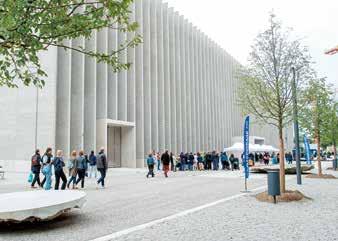
TOTAL WORK OF ART
foundations.
Encompassing a whole district of Lausanne, near the railway station, visitors will be able to experience fine art, photography, design, textile arts, as well as auditoriums, dining spaces, artist residencies, boutiques and bookshops.


The “Gesamtkunstwerk” – or “total work of art” – by Le Corbusier, completed in 1967, is a real architectural masterpiece. The last building constructed by the great SwissFrench architect, designer, and artist is the only of his buildings to be entirely made from glass and steel

ABBEY LIBRARY OF ST GALL, ST GALLEN
Set in the town of St Gallen, the Abbey is one of the world’s oldest working libraries, dating back to the 8 th century, when the Abbey of St Gall first opened its doors. A Unesco World Heritage Site, the lavishly elaborate rococo library you enter today dates from the 18th century and, with its magical atmosphere and stunning examples of artistry and craftsmanship on display all around you, this fantastical place makes for an awe-inspiring experience.

cordmagazine.com 43
Encircled by the Aare River, Bern’s old town dates back to the 12th century, and its 6km of medieval arcades and handsome 18th-century limestone buildings are perfect for a luxurious day of leisurely strolling
Plateforme 10, Lausanne
Swiss National Museum, Zurich
Skyline with old-town landmarks, Bern
GLE average fuel consumption: 7.6 - 8.7l/100 km, CO₂ emission (average) 199.0 - 229.0 g/km.
GLE Coupé average fuel consumption: 7.5 - 8.4l/100 km, CO₂ emission (average) 197.0 - 220.0 g/km. Air pollutant emissions from traffic vastly contribute to overall air quality deterioration, especially in the case of above-average concentration of ground-level ozone, PM10 particles, PM2,5 particles and nitrogen-oxide. Stated figures represent determined “WLTP CO2 figures” pursuant to Article 2, No. 3, of Implementing Regulation (EU) 2017/1153. Fuel consumption figures have been calculated on this basis.

K
W
T H E N E W G L E
N O W Y O U R
A Y


















































































